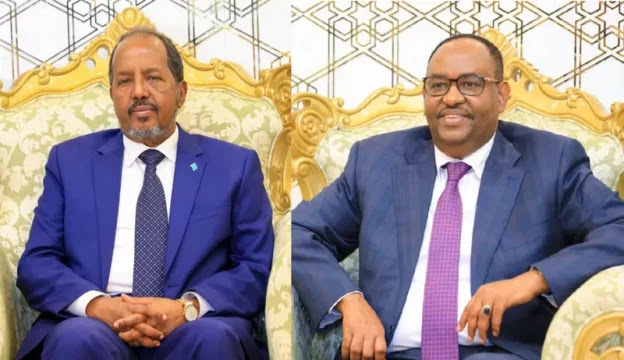Garoowe (Kaab TV)– The Puntland State of Somalia finds itself on a collision course with the nation’s government in Mogadishu, as a recently announced blue economy strategy clashes with its existing laws.
This conflict emerged after Somalia ordered all foreign vessels to exit its exclusive economic zone in an effort to regulate fishing and reclaim the nation’s marine resources.
Three weeks ago, Somalia unveiled its blue economy strategy to regain control over the country’s marine wealth.
This strategy is part of a new draft law that the country’s federal states must approve for it to become the guiding policy for the nation.
Puntland State’s objections
However, Puntland State, one of the five federal states in Somalia, has raised concerns over the need for more consultation regarding the new policy.
The Puntland Ministry of Fisheries and Marine Resources argues that the policy violates the federal structure, as sharing natural resources should be based on discussions with the federal state governments.
According to a statement from Puntland State, “The policy implemented by Somalia’s Ministry of Fisheries and Blue Economy infringes upon the constitution and pre-existing agreements like the Baidoa Agreement and the Addis Ababa Agreement, which govern the apportionment of fisheries resources between the Federal Government of Somalia and Federal Member States (FGS and FMS), including the oversight of resource distribution.”
The statement further emphasizes the importance of these agreements in defining the negotiation process for sharing national fisheries resources.
Underlying disagreements
Farah Ali, a fisheries expert in Bossaso, told Caasimada Online that the primary disagreement between the two levels of government stems from their differing views on resource sharing.
“Puntland aspires to capitalize on its extensive marine coastline, comprising nearly one-third of Somalia’s 3,333-kilometer shoreline. The state will maintain this stance until a comprehensive national resource-sharing framework is established,” Ali explained to (Kaab TV).
With the backing of the Intergovernmental Authority on Development (IGAD), Somalia has been revising its blue economy policy to exert greater control over its marine resources, which have suffered from years of exploitation.
Dr. Guleid Artan, the Director of the Intergovernmental Authority on Development (IGAD) Climate Predictions and Applications Centre (CPAC), revealed that IGAD has been collaborating with the Somali Ministry of Fisheries and Blue Economy for the past four months to develop a national blue economy strategy for the country
Following a workshop earlier this year, both parties agreed that the new strategy would prioritize the economic and strategic aspects of the nation’s resources.
They stated, “A well-implemented Blue Economy Strategy will result in a significant overhaul of institutional frameworks and governance models,”
However, certain federal states like Puntland have established direct engagements with foreign entities seeking to fish in Somali waters. The impact of the new policy on these existing contracts remains unclear.
Somalia recently expanded the mandate of its Ministry of Fisheries and Blue Economy, a move that the Puntland government contends it needed to be sufficiently consulted on.
As the two parties grapple with these issues, the future of Somalia’s blue economy strategy and its implications for resource sharing hang in the balance.


